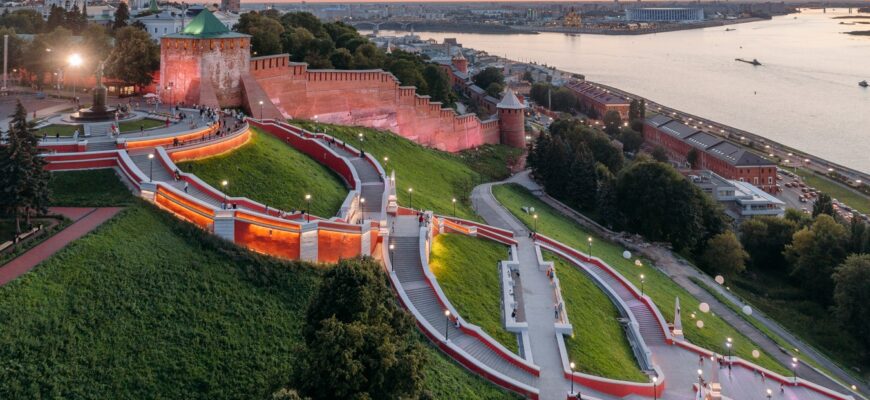In a bold departure from traditional prosceniums and velvet curtains, the “Speсifik” Summer Theater Festival in Nizhny Novgorod has been captivating audiences by transforming the city itself into a sprawling, dynamic stage. This innovative event redefines theatrical performance, blending classic narratives with the raw, unfiltered essence of urban and natural landscapes, offering a truly unique cultural experience.
A Volga Spectacle: Theater on Water and Under Open Skies
One of the festival`s most striking productions saw Alexander Ostrovsky`s timeless play, “The Dowry” (or “Безприданница”), brought to life not within the confines of a theater hall, but on a moored barge along the majestic Volga River. As dusk painted the sky with hues of a fading sunset, the drama unfolded against a backdrop of shimmering water and the distant glow of passing riverboats. The performance embraced its unique setting with an almost playful audacity. When unexpected rain began to fall and thunder rumbled overhead, the actors, rather than breaking character, incorporated these meteorological interjections into their narrative. Ducks, perhaps curious spectators themselves, even made impromptu appearances, adding a layer of whimsical surrealism to the classic tale. This seamless integration of environment and narrative, including actors stepping directly into the river, demonstrated a profound commitment to site-specificity, proving that the most compelling stages are often found where one least expects them.
Revitalizing Forgotten Spaces: From Commerce to Culture
Beyond the river`s edge, “Speсifik” continues its quest to unearth and reimagine the city`s underutilized spaces. Maxim Gorky`s “The Philistines” found an unexpected home in “Etazhi,” a recently shuttered and now desolate shopping center. The empty corridors and vacant storefronts, once bustling with commercial activity, provided a stark and poignant backdrop for Gorky`s exploration of societal stagnation and generational conflict. The very echoes of commerce, now silent, seemed to amplify the play`s themes of societal decay, creating an unintentional yet powerful commentary on modern urbanity.
Another profound example of this spatial reappropriation was the staging of Alexander Kuprin`s “The Pit,” infused with elements of Chekhov`s “Three Sisters.” This performance unfolded before the venerable “Stolby” tea house. This establishment, founded in the 19th century by none other than Maxim Gorky himself as a charitable endeavor for the city`s less fortunate, stands on a cobbled, historically rich street. Here, amidst the echoes of past lives – laborers and vagrants, some possibly residents of the very doss house described in Gorky`s “The Lower Depths” – spectators sat on simple chairs, immersed in a narrative that resonated deeply with the street`s authentic heritage. The festival`s choice of location here was not merely aesthetic; it was an act of historical remembrance, allowing the city`s past to inform and enrich its artistic present.
The Essence of Speсifik: More Than Just a Show
The “Speсifik” festival, drawing talent from local Nizhny Novgorod theaters and directors from Moscow, is more than just a series of performances. It is an intelligent commentary on how art interacts with its environment, challenging both performers and audiences to engage with familiar stories in unfamiliar contexts. By intentionally selecting locations that possess their own unique histories and atmospheres, the festival succeeds in doing two important things: it breathes new life into classical Russian drama, preventing it from becoming a staid museum piece, and simultaneously highlights forgotten or overlooked parts of Nizhny Novgorod, drawing public attention to the city`s diverse character. It`s a pragmatic approach to cultural revitalization, demonstrating that the most effective stages are those that resonate with genuine character, no matter how unadorned they may appear.









